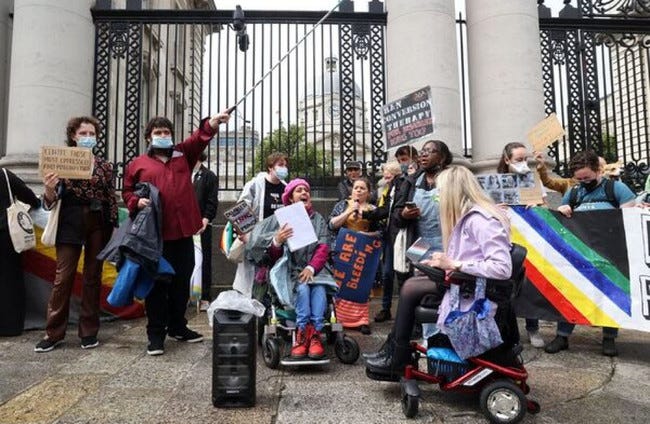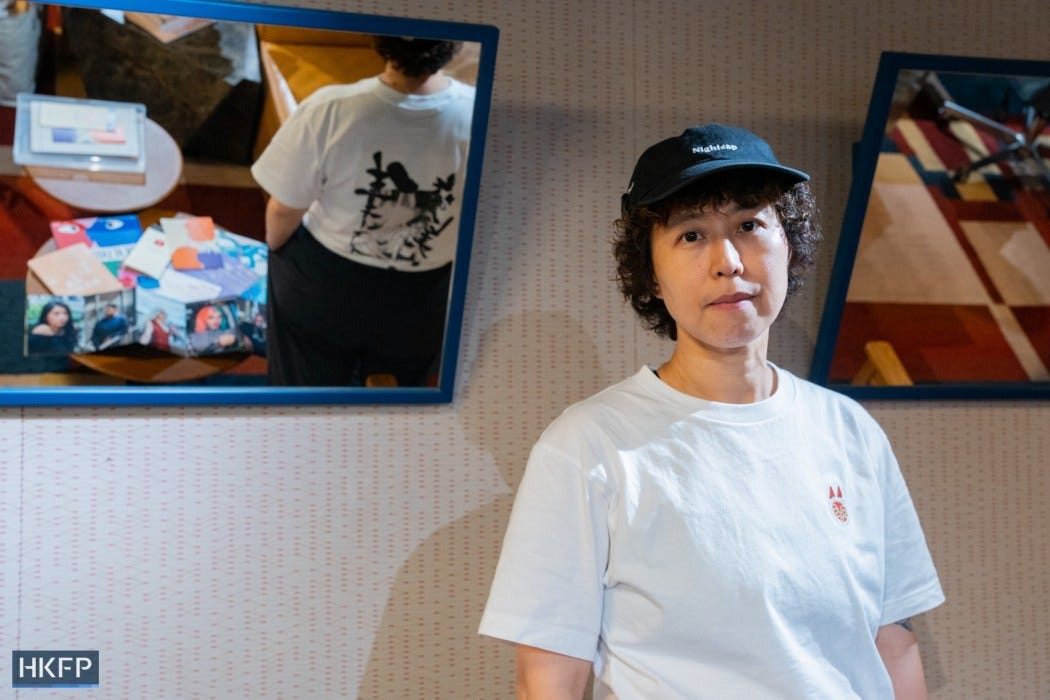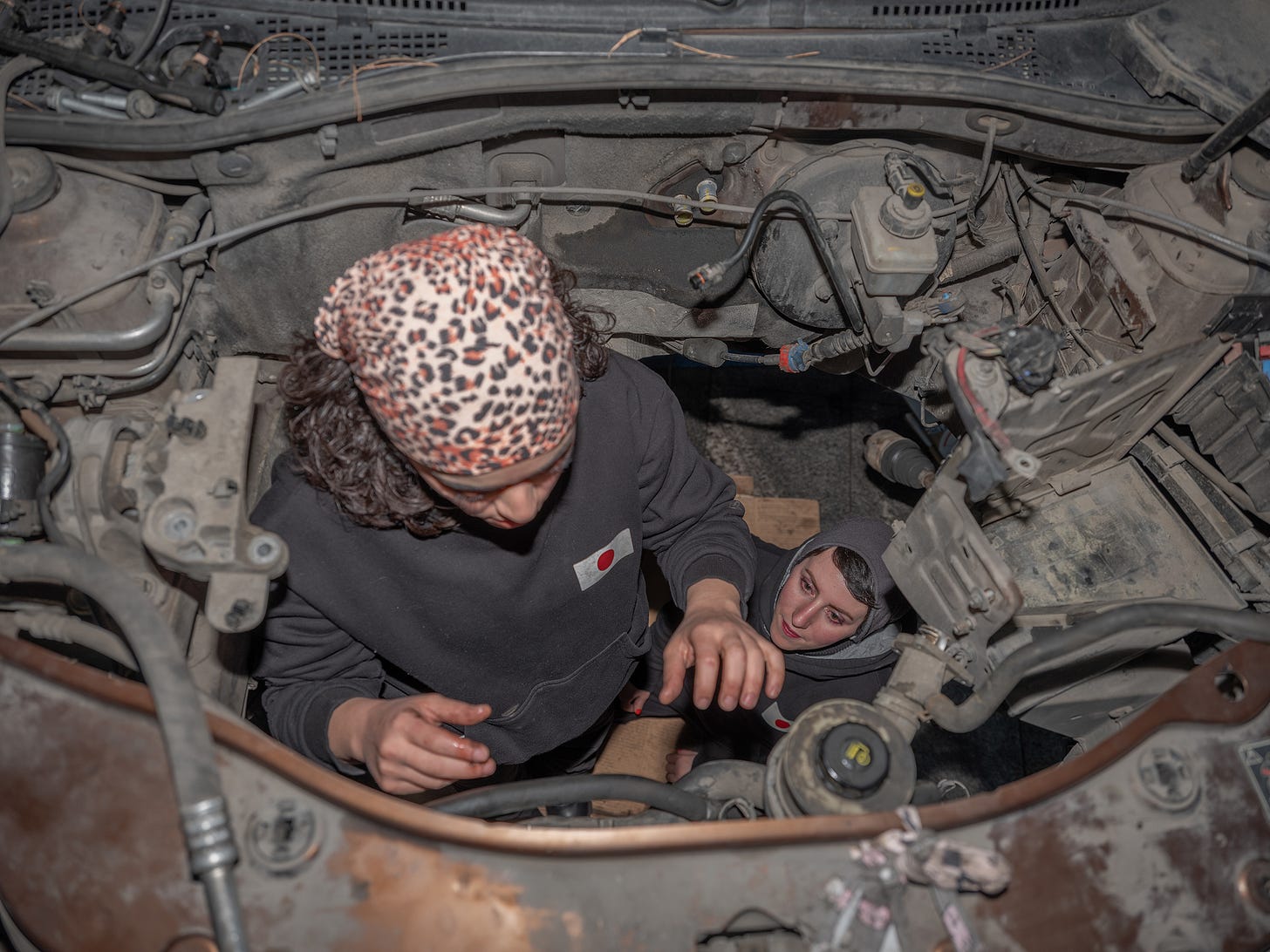Global Roundup: Genocide Toll on Pregnant Palestinian Women, Disability Pride Month, Japan Trans Rights, Hong Kong Queer Community, Iran Young Women
Curated by FG Contributor Samiha Hosssain
The majority of Palestinians killed by Israel in Gaza are women and children. (Photo: Mahmoud Ajjour, The Palestine Chronicle)
Over the past 9 months since October 7, an estimated 50,000 babies have been born in the Gaza Strip, with some women self-inducing labor to avoid giving birth on the move while others are scared to seek vital prenatal care because of fears of bombing, according to the Save the Children organization. Many women are “giving birth in traumatic, unhygienic and undignified conditions without access to basic services,” and some have lost their lives due to a lack of access to doctors, the organization said last week.
We’ve seen the continuous stress and misery taking a toll on women, with some making drastic choices such as self-inducing labor using medication out of fear they might lose their babies if they have to flee again for survival. - Sharifa Khan, midwife with Save the Children’s Emergency Unit
Khan recounts several cases where mothers’ and babies' lives were in danger. Pregnant women are facing significant challenges, including a lack of food and clean water, frequent displacement, the traumatic loss of loved ones, and the fear of injury or death. In addition, power blackouts pose extreme risks to critically ill babies, including those in incubators.
Israel is currently on trial before the International Court of Justice for genocide against Palestinians. According to Gaza’s Ministry of Health, 38,243 Palestinians have been killed, and 88,033 wounded. Moreover, at least 11,000 people are unaccounted for, presumed dead under the rubble of their homes throughout the Strip. Palestinian and international organizations say that the majority of those killed and wounded are women and children.
Disability Pride in Dublin last year. Rolling News
Hoireabhaird discussed how she hasn’t always taken pride in her disability but that changed on 26 July, 2016 when she was 19 years old. A man broke into a care facility for people with disabilities in Sagamihara, Japan and proceeded to stab 19 residents to death and injure 26 others. The attacker drove to a local police station, turned himself in, and stated that he wished for all disabled people to “disappear”.
The attack in Japan came at a time when I was slowly coming to the realisation that my negative attitude and unwillingness to accept my own disability was part of the bigger problem. But I didn’t know who to turn to with this struggle. -Niamh Ní Hoireabhaird
Hoireabhaird said she found community on online forums and learned about her “internalised ableism.” 26 July is also significant for Hoireabhaird and the disabled community because on that day in 1990, US President George H. Bush signed the Americans with Disabilities Act (ADA) into law. It evolved into a month-long celebration in July, which has become known as Disability Pride Month throughout the world. In Ireland, for instance, disability activist Maryam Madani set up Disability Pride Ireland in 2022. Ireland’s second Disability Pride and Power Parade will take place on 27 July, 2024.
The idea of disabled people having anything to be proud of about our identity, culture and bodies is still a radical concept. The fact that Disability Pride Month is hardly understood or discussed is a symptom of our extreme marginalisation and how far behind we are in achieving our rights and cultural inclusion even compared to other social movements. -Maryam Madani
Hoireabhaird recognized the increased representation in the public realm, stronger legislation and increased awareness about disability but said that there is still a very long way to go until all societal barriers are dismantled and disabled people are valued and equal. She listed low employment rates, a housing crisis and limited financial support as some barriers.
Fostering an informed, inclusive and supportive society that values and celebrates disability will require constant and arduous work from everyone. With advocates like [Rosaleen] McDonagh, [Sinéad] Burke and Madani, disability pride has a fighting chance in Ireland. -Niamh Ní Hoireabhaird
A supporter for the LGBTQ community holds up a poster that reads "Legalize the same-sex marriage" in Tokyo, on March 14.Hiro Komae / AP file
Under the law, transgender people who want to have their gender assigned at birth changed on official documents must be diagnosed as having gender dysmorphia and must undergo an operation to remove their sex organs. The Hiroshima High Court ruled last week that the current requirement is possibly unconstitutional, signalling a change in how gender issues are being addressed in Japan.
The claimant, only identified as a resident of western Japan in her late 40s, was assigned male at birth. Her request for a legal gender change in her documents was rejected by lower courts. She has argued through her lawyers that the surgery requirement forces a huge economic and physical burden and that it violates the constitution’s protection of equal rights. The Supreme Court, in a landmark decision in October, ruled that the sterilization requirement is unconstitutional but sent the transgender woman's case back to the High Court, ordering it to reexamine if the claimant can avoid a gender-affirming surgery, something it failed to address in its earlier ruling. The hormonal therapy sufficiently feminized the claimant’s body, including her genitalia, without the surgery, the court said. Last week’s decision now allows the claimant to have her gender in official records match her identity.
Members of the Japan Alliance for LGBT Legislation, in a statement, said that the Hiroshima ruling can be considered progress because "it can open the door for transgender females to be able to legally change their gender without undergoing surgery.” But it said questions remain because it fell short of including those who cannot take hormones. The group said it will keep fighting discrimination against transgender people.
Photo: Kyle Lam/HKFP.
Hong Kong independent publisher Beatrix Pang, who co-founded a mobile library to advocate for queer inclusivity and visibility, is exploring ways to transform solidarity with the LGBTQ community into an “everyday” practice. Pang, who is non-binary, said that they had noticed some members of Hong Kong’s LGBTQ community had become less active in recent years. This “quietness” stirred up a sense of unease in the publisher, they said, as it was in stark contrast to the vibrant LGBTQ community they experienced during a 12-month artist residency at Studio Voltaire in London last year.
When I was in London, it was an everyday practice for people to meet friends through book fairs or zine festivals. How day-to-day is the solidarity of the LGBTQ community in Hong Kong? Do we only see each other during events and get together in June? -Beatrix Pang
In the hope of stimulating those interactions within Hong Kong’s queer community, Pang invited three Japanese publishers they had met at an overseas fair earlier this year. Hokkaido-born artist Kai began making over and over magazine with another creator in 2021. The queer community in Japan “lacked intersectionality,” the 26-year-old said, adding they wanted a new publication that would cover city culture, including fashion, music and environmental protection, from a “queer angle.” Another Japanese creator, Yuki, brought copies of a zine featuring photos of traffic cones they encountered during their work as a bike messenger. They photoshopped the cones into the colours of pride flags and included pages to explain the meaning behind each one. Graphic designer Yo Katami, 50, shared a zine he had produced during the pandemic showcasing portraits of queer expatriates who were stranded in Japan because of Covid-19. Another publication he brought with him was a zine documenting an event last year that celebrated the LGBTQ community in East Asia, with a focus on the older generation.
Some of these people are passing away. They really want to use publishing to preserve their memories and ideas for the next generation. -Yo Katami
Facing what they described as a “shrinking space for expression” for sexual minorities, Pang said they were lucky to have found a private venue that allowed their peers to gather and interact in person. Their next move in bringing the queer community together is through a monthly gathering during which people are invited to sit down and read the library’s collection.
Kiana and Niloofar at Kiana's workplace north of Tehran on Feb. 5, 2022. They pulled out the engine, and are repairing the radiator. Photo: Forough Alaei
Over the course of two years, Iranian photojournalist Forough Alaei traveled her native country documenting the women who, like the late Mahsa Amini facing arrest by “morality police,” simply refused. When she first started photography, Alaei was discouraged by others but she persevered, at one point sneaking into a soccer game disguised as a man, and ended up winning a 2019 World Press Photo award for her effort. Three women’s stories will be shared in this Roundup.
In this project, I tried to show the female role-models on whose shoulders Gen Z stands, these brave women who broke the taboos in many fields. I thought it was an overlooked story in the ever-evolving society of Iran. -Forough Alaei
Kiana Yarahmadi and Niloofar Farahmand, 33, have been friends for over 10 years. They are among the first female professional car mechanics in Iran. The pair chose to begin teaching themselves in 2019, documenting their process on Instagram, where they racked up thousands of followers and posts that went viral.
Although I wasn’t allowed to do many things, I finally did them and proved myself to the critics. I always find a way to do what I love to—with all of its burdens. -Niloofar Farahmand
Parva Karkhane, 36, has been painting professionally for 15 years, focusing on women and self-portraits. Coming from Kermanshah, a Kurdish region of northwestern Iran, her career choice is a contrast to the norms of her conservative family, where women are expected to marry and rear children. She says her work has eastern and Iranian roots. The isolated and delicate women who are nude in some situations draw a lot of attention. In galleries, she is often forced to cover her work with paper or fabric.
Nasrin Teymouri is the supervisor of the first female stunt team in Iran, named Kheybar. Their stunts range from falling down the stairs to simulating car crashes—and sometimes involve fire. Teymouri is also a member of Iran Cinema House, where she mentors both men and women.
I suggest to those girls who follow their desires that nothing is impossible ... I believed in myself and I did it. I’ve been trying to help other women of our country to follow their wishes and that’s the strongest reason I became a mentor for stuntwomen. -Nasrin Teymouri
Thank you for reading Global Roundup. You can support FEMINIST GIANT by:
Hitting the heart button so that others can be intrigued and read
Upgrading to a paid subscription to help keep FEMINIST GIANT free
Opting for a one-time payment via buying me a coffee
Sharing this post by email or on social media
Samiha Hossain (she/her) is an aspiring urban planner studying at Toronto Metropolitan University. Throughout the years, she has worked in nonprofits with survivors of sexual violence and youth. Samiha firmly believes in the power of connecting with people and listening to their stories to create solidarity and heal as a community. She loves learning about the diverse forms of feminist resistance around the world.






